 Petzlover
Petzlover Borzoi is originated from Bosnia and Herzegovina but Tenterfield Terrier is originated from Australia. Borzoi may grow 54 cm / 22 inches higher than Tenterfield Terrier. Borzoi may weigh 17 kg / 38 pounds more than Tenterfield Terrier. Borzoi may live 4 years less than Tenterfield Terrier. Borzoi may have more litter size than Tenterfield Terrier. Borzoi requires Moderate Maintenance. But Tenterfield Terrier requires Low Maintenance
Borzoi is originated from Bosnia and Herzegovina but Tenterfield Terrier is originated from Australia. Borzoi may grow 54 cm / 22 inches higher than Tenterfield Terrier. Borzoi may weigh 17 kg / 38 pounds more than Tenterfield Terrier. Borzoi may live 4 years less than Tenterfield Terrier. Borzoi may have more litter size than Tenterfield Terrier. Borzoi requires Moderate Maintenance. But Tenterfield Terrier requires Low Maintenance
 Developed in Russia and also known as the Russian Wolfhound, the Borzoi was used to hunt wolf in the country. By 1873 there were only a few Borzoi which remained, and the Imperial Association was created to protect this graceful, elegant dog. They were often presented to European nobility as gifts, and thanks to a few dedicated breeders, the breed was saved from extinction and exported to other parts of the world. He was imported to the UK in the late 19th century, and it was Princess Alexandra who did a lot to increase the dog’s popularity in Britain.
Developed in Russia and also known as the Russian Wolfhound, the Borzoi was used to hunt wolf in the country. By 1873 there were only a few Borzoi which remained, and the Imperial Association was created to protect this graceful, elegant dog. They were often presented to European nobility as gifts, and thanks to a few dedicated breeders, the breed was saved from extinction and exported to other parts of the world. He was imported to the UK in the late 19th century, and it was Princess Alexandra who did a lot to increase the dog’s popularity in Britain.
The tall, slender, elegant dog was recognized by the AKC in 1891. The Borzoi Club of America, which started off being known as the Russian Wolfhound Club was formed but in 1936 the name was changed to Borzoi. The Russian world ‘Borzoi’ is a term used to encompass all Sight Hounds. Today he is no longer used for hunting but is a gentle companion.
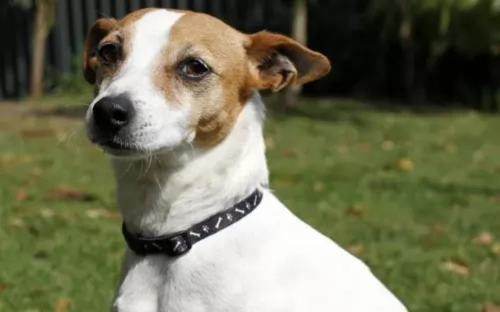 The ancestors of the Tenterfield Terrier came to Australia with the British and from them came this Australian breed. The English terriers were bred to be ratters on the ships to Australia. Today’s breed is a hardy, strong, athletic and agile dog. These first dogs were miniature Fox Terriers, bred for ratting. The miniature Fox Terrier was an established breed in the late 19th century in Australia with families and was know as a Mini Foxie. The breed became a steady presence in homes by the 1920’s.
The ancestors of the Tenterfield Terrier came to Australia with the British and from them came this Australian breed. The English terriers were bred to be ratters on the ships to Australia. Today’s breed is a hardy, strong, athletic and agile dog. These first dogs were miniature Fox Terriers, bred for ratting. The miniature Fox Terrier was an established breed in the late 19th century in Australia with families and was know as a Mini Foxie. The breed became a steady presence in homes by the 1920’s.
The breed might not have been named after the area of Tenterfield as many have guessed. Instead they may have been named after a breeder. The owner of the Tenterfield saddlery was called Tenterfield Saddler and he owned several of the breed. In 1990, Don Burke, a television personality suggested the breed be named the Tenterfield Terrier.
The Miniature Fox Terrier Club of South Australia. Now there were several clubs in Australia and a lot of disagreement about exactly what type of dog a miniature fox terrier was. Some did not think the name was legitimate, but they wanted recognition from the Australian National Kennel Club (ANKC). So, they became the Tenterfield Terrier Club of Australia in 1993. They were recognized by 2002.
Today the breed standard for the Tenterfield Terrier is different from the one for the Miniature Fox Terrier. They are now entirely separate breeds. In addition to the ANKC, the breed is recognized by the New Zealand Kennel Club but not by the AKC. It is also recognized by the American Pet Registry, Inc, the American Canine Registry and the Dog Registry of America, Inc.
 The Borzoi’s silky coat is longer with the male dogs than with the females. The height of these tall graceful dogs is 68 to 74cm. You’ll find that the Borzoi’s back is quite bony and it rises in a curve. He has a tall, lean body and a long, narrow head to match with small, thin ears which rest backwards towards the neck.The silky coat comes in a number of colors - tan, white, black or a mix such as sandy and white or tan and white. The coat is often wavy or slightly curly. The soft undercoat becomes thick in the Winter and he sheds this hair in hotter weather. You’ll find the coat frills on the neck and there is feathering on the hindquarters and with the long tail.
The Borzoi’s silky coat is longer with the male dogs than with the females. The height of these tall graceful dogs is 68 to 74cm. You’ll find that the Borzoi’s back is quite bony and it rises in a curve. He has a tall, lean body and a long, narrow head to match with small, thin ears which rest backwards towards the neck.The silky coat comes in a number of colors - tan, white, black or a mix such as sandy and white or tan and white. The coat is often wavy or slightly curly. The soft undercoat becomes thick in the Winter and he sheds this hair in hotter weather. You’ll find the coat frills on the neck and there is feathering on the hindquarters and with the long tail.
The Borzoi is a gentle, sweet dog, to such an extent that they don’t make good watch-dogs. He is good with other pets and children, although he isn’t the kind of dog to indulge in games with children. He doesn’t bark much and he is also not a high-energy dog, being fairly happy to make himself at home indoors. This is a faithful, loyal and courageous dog.
His temperament is quiet, sensitive, intelligent and somewhat aloof. Even though he has these quiet characteristics, he will still need training and socialization as this just rounds your dog off, making him a pleasure to have around.
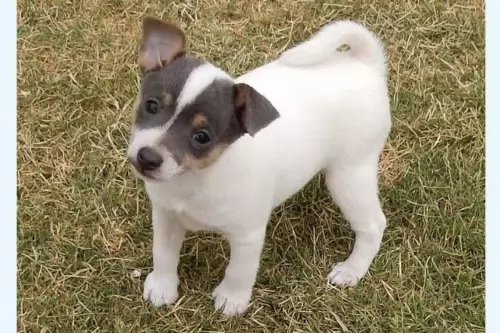 The Tenterfield Terrier is square and compact. He has a head shaped like a wedge and unusual in the terrier group. They have pricked ears and are predominantly white mixed with tan or black. They could also be tri-colored in black/tan and white or tan/liver and white. They have naturally occurring bob tails or docked tails. The nose is usually black unless the dog is liver colored, they have liver noses. The jaws are strong, and lips are tight with a strong neck.
The Tenterfield Terrier is square and compact. He has a head shaped like a wedge and unusual in the terrier group. They have pricked ears and are predominantly white mixed with tan or black. They could also be tri-colored in black/tan and white or tan/liver and white. They have naturally occurring bob tails or docked tails. The nose is usually black unless the dog is liver colored, they have liver noses. The jaws are strong, and lips are tight with a strong neck.
 If you’re looking for a quiet, amicable, elegant breed, you’ll love the big Russian Borzoi, known for his gentleness, sweetness and gracefulness. He is a friendly dog with his human family, although not too keen on children with their boisterous games. It is his gentleness however, that has endeared him to so many dog lovers.
If you’re looking for a quiet, amicable, elegant breed, you’ll love the big Russian Borzoi, known for his gentleness, sweetness and gracefulness. He is a friendly dog with his human family, although not too keen on children with their boisterous games. It is his gentleness however, that has endeared him to so many dog lovers.
Even though he isn’t one of the most active dogs, he will still need exercise and a walk as he is a big dog used to wide, open spaces. He’ll need the opportunity every now and then to simply run.
He makes a wonderful pet for new- or seasoned pet owners, and if you’re looking for a quiet, devoted companion, why not welcome an elegant, graceful Borzoi into your home?
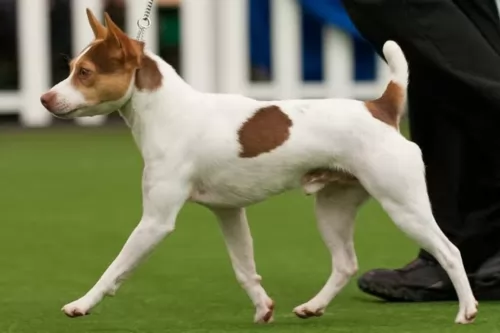 3.Adaptability – they need space even though they are small. They need a lot of exercise. They can adapt if they get another exercise. They can live in apartments and can play indoors as well as out.
3.Adaptability – they need space even though they are small. They need a lot of exercise. They can adapt if they get another exercise. They can live in apartments and can play indoors as well as out.
4.Learning ability – They are extremely intelligent, but they can be stubborn like all terriers.
 The Borzoi is a healthy dog, and you’re not likely to be taking him to the veterinarian often but you do need to know about illnesses which are more prevalent in these large breed dogs.
The Borzoi is a healthy dog, and you’re not likely to be taking him to the veterinarian often but you do need to know about illnesses which are more prevalent in these large breed dogs.
This is a common bone tumor found in dogs and it is more commonly found in large breeds. It can spread quickly to other parts of the body, and although there are treatments, the long term prognosis isn’t good. Your dog will have pain and swelling.
Lymphosarcoma is a common cancer diagnosed in dogs. It is a cancer of lymphocytes and the average dog gets it from 6 years on. Some dogs may not necessarily feel sick, while others are tired, they don’t eat, they lose weight and may have diarrhea.
This is a disease that can be deadly for your dog. Known as gastric dilatation, the stomach twists and fills with gas, putting pressure on the diaphragm, and creating breathing problems. Bloat is more common in large breeds and its up to you as a responsible dog owner to watch out for a swollen stomach with drooling and attempts to vomit.
Remember that some health problems are inherited, but there are other health problems that can be prevented by the way you treat- and raise your dog.
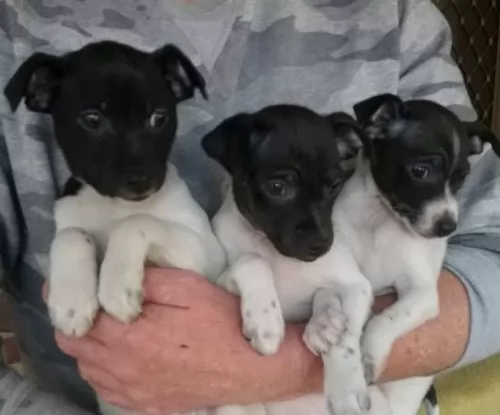 They are small in stature and because of their face they seem to have dental issues. The breed does not have a lot of health issues but deals with the same issues as many small terriers. Not all members of the breed are susceptible to these, but some are just like the Australian Terrier.
They are small in stature and because of their face they seem to have dental issues. The breed does not have a lot of health issues but deals with the same issues as many small terriers. Not all members of the breed are susceptible to these, but some are just like the Australian Terrier.
 Long coated dogs shed, and the Borzoi female sheds after her season and the males shed annually. Once the female is spayed, she sheds like the males. You will need to be brushing your Borzoi every day to rid the dogs of this loose hair.
Long coated dogs shed, and the Borzoi female sheds after her season and the males shed annually. Once the female is spayed, she sheds like the males. You will need to be brushing your Borzoi every day to rid the dogs of this loose hair.
Borzoi teeth collect tartar, more so than with other breeds, so their teeth will need to be brushed at least 3 times a week with special dog toothbrushes and toothpaste to prevent gum and tooth problems.
Good quality food is the foundation for good health with your pet. Home-made food is always good for your dog and should include meat, rice and vegetables. Apart from top quality commercially manufactured food for large breed dogs and recommended by your vet, make sure to include some raw meat into your Borzoi’s diet too. This is imperative to stave off ill health and skin problems. Make sure he has a constant supply of fresh, cool water available to him.
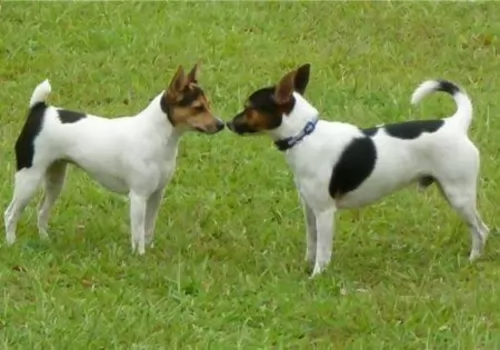 1.Feeding the puppy – Don’t overfeed but do feed high quality puppy food for small breeds and terriers.
1.Feeding the puppy – Don’t overfeed but do feed high quality puppy food for small breeds and terriers.
2.Feeding the adult – This is an active breed but don’t overfeed. Feed a high quality adult dog food for terriers or small breeds. Feed 2 times a day.
4. Games and Exercises – The breed has a high energy level and needs a lot of exercise. He is a terrier and loves to “go to ground”. Play activities that allow him to do that are best. He plays barn hunt, lure coursing and terrier specific competitions.